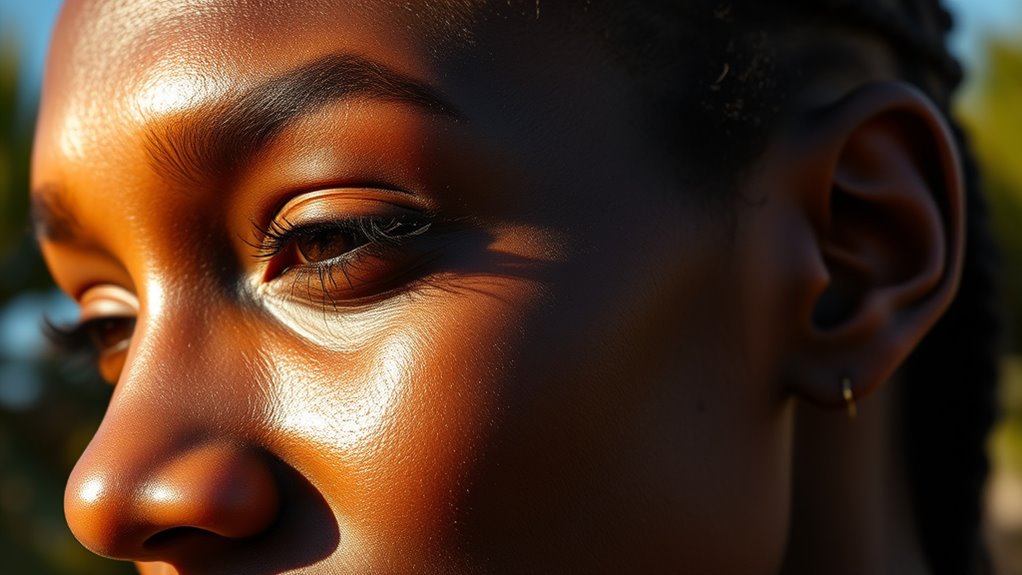Many believe that darker skin doesn’t need sunscreen because of its natural melanin. However, this is a myth. While melanin offers some protection, it isn’t enough to prevent sun damage, aging signs, or skin cancer. UV rays can still penetrate deeply, causing long-term harm. If you keep an open mind, you’ll discover why everyone benefits from wearing SPF daily and how to protect your skin effectively.
Key Takeaways
- Darker skin contains more melanin but still needs SPF to protect against UV damage.
- Melanin offers limited natural protection; it doesn’t prevent skin aging or cancer.
- Sun exposure can cause hyperpigmentation and skin damage regardless of skin tone.
- Regular use of broad-spectrum sunscreen helps maintain skin health and youthful appearance.
- Neglecting sun protection increases risks of skin cancer and accelerates aging in darker skin tones.

Many people with darker skin believe they don’t need sunscreen, but this is a dangerous myth. Just because your skin has more melanin doesn’t mean you’re immune to the sun’s harmful rays. In fact, understanding the SPF importance can help you protect your skin effectively. SPF, or Sun Protection Factor, indicates how well a sunscreen shields you from UVB rays, which are responsible for causing sunburn and skin damage. Using an adequate SPF helps prevent premature skin aging, a process accelerated by sun exposure. When you skip sunscreen, you’re exposing your skin to UV radiation that can lead to wrinkles, fine lines, age spots, and loss of firmness over time. Many believe that darker skin is resistant to these signs of aging, but this isn’t true. While melanin offers some natural protection, it’s not enough to prevent skin aging caused by the cumulative effects of sun damage.
The misconception that darker skin doesn’t need sunscreen often results in neglecting proper sun protection, increasing the risk of developing hyperpigmentation, dark spots, and even skin cancer. UV rays penetrate deeper layers of the skin, damaging collagen and elastin fibers, which are vital for maintaining skin’s youthful appearance. When you don’t wear sunscreen regularly, you allow UV radiation to accelerate the breakdown of these structural proteins, speeding up skin aging. This damage is often invisible initially but accumulates over years, making your skin look older than your actual age.
It’s essential to incorporate SPF into your daily skincare routine, regardless of skin tone. Look for broad-spectrum sunscreens that protect against both UVA and UVB rays. Apply generously, and don’t forget areas like your ears, neck, and hands—places often overlooked but equally vulnerable. Reapply every two hours if you’re outdoors, especially during peak sunlight hours. Remember, wearing protective clothing, seeking shade, and avoiding direct sun exposure during peak hours further reduce your risk of premature skin aging.
Frequently Asked Questions
Can Darker Skin Tones Still Develop Skin Cancer?
Yes, darker skin tones can still develop skin cancer. While melanin offers some protection against UV rays, it doesn’t eliminate the sunburn risk or prevent skin cancer entirely. You need to wear sunscreen daily, especially if you spend time outdoors, because melanin isn’t a complete shield. Protecting your skin reduces long-term damage and lowers your risk, regardless of your skin tone.
Does Sunscreen Cause Vitamin D Deficiency in Darker Skin Individuals?
Think of sunscreen as a shield that blocks harmful rays, just like an umbrella in a storm. You might worry it blocks vitamin D absorption, but with darker skin, your melanin already offers some protection. Regular use of sunscreen doesn’t cause vitamin D deficiency or increase skin cancer risk. Instead, it helps prevent skin damage, so you can enjoy sunshine safely while maintaining healthy vitamin D levels.
Are There Specific Sunscreens Recommended for Darker Skin?
You should choose sunscreens with formulations that suit your skin tone and offer broad-spectrum protection. Look for sunscreens labeled as suitable for darker skin, which often contain formulations that minimize white cast and match your skin tone better. Prioritize those with high SPF and ingredients like zinc oxide or titanium dioxide for effective protection. This way, you guarantee your sunscreen is compatible with your skin tone and provides ideal defense against UV rays.
How Often Should Darker Skin Individuals Reapply Sunscreen?
You won’t believe how often you should reapply sunscreen during the day! For essential sun protection routines, you need to reapply every two hours, especially if you’re sweating or swimming. Even darker skin needs this care to prevent damage. Don’t skip reapplication—it’s vital for lasting protection. Make it a habit to refresh your sunscreen regularly, so your skin stays safe and healthy all day long.
Does Sunscreen Prevent Hyperpigmentation in Darker Skin?
You might wonder if sunscreen prevents hyperpigmentation in darker skin. While sunscreen efficacy varies, it can notably help in hyperpigmentation prevention by shielding your skin from UV damage that triggers dark spots. Regular use, especially with broad-spectrum SPF, reduces the risk of uneven skin tone. So, yes, sunscreen is a key tool in managing hyperpigmentation, and applying it daily helps protect your skin’s health and appearance.
Conclusion
Remember, beauty and health go hand in hand—darker skin does need sunscreen. Don’t be fooled by myths; your skin is just as vulnerable to damage. As the saying goes, “An ounce of prevention is worth a pound of cure.” Protect your skin daily, and you’ll thank yourself in the long run. Skin health isn’t a matter of color; it’s a matter of taking responsibility for your well-being.









